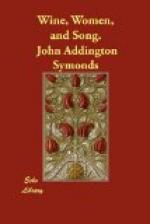The Carmina Burana, by their frequent references to linden-trees and nightingales, and their numerous German refrains, indicate a German home for the poems on spring and love, in which they are specially rich.[14] The collections of our own land have an English turn of political thought; the names Anglia and Anglus not unfrequently occur; and the use of the word “Schellinck” in one of the Carmina Burana may point, perhaps, to an English origin. France claims her own, not only in the acknowledged pieces of Walter de Lille, but also in a few which exhibit old French refrains. To Italian conditions, if not to Italian poets, we may refer those that introduce spreading pines or olive-trees into their pictures, and one which yields the refrain Bela mia. The most important lyric of the series, Golias’ Confession, was undoubtedly written at Pavia, but whether by an Italian or not we do not know. The probability is rather, perhaps, in favour of Teutonic authorship, since this Confession is addressed to a German prelate. Here it may be noticed that the proper names of places and people are frequently altered to suit different countries; while in some cases they are indicated by an N, sufficiently suggestive of their generality. Thus the Confession of Golias in the Carmina Burana mentions Electe Coloniae; in an English version, introduces Praesul Coventriae. The prayer for alms, which I have translated in Section xiii., is addressed to Decus N——, thou honour of Norwich town, or Wittenberg, or wherever the wandering scholar may have chanced to be.
With regard to the form and diction of the Carmina Vagorum, it is enough to say two things at the present time. First, a large portion of these pieces, including a majority of the satires and longer descriptive poems, are composed in measures borrowed from hymnology, follow the diction of the Church, and imitate the double-rhyming rhythms of her sequences. It is not unnatural, this being the case, that parodies of hymns should be comparatively common. Of these I shall produce some specimens in the course of this study. Secondly, those which do not exhibit popular hymn measures are clearly written for melodies, some of them very complicated in structure, suggesting part-songs and madrigals, with curious interlacing of long and short lines, double and single rhymes, recurrent ritournelles, and so forth.




